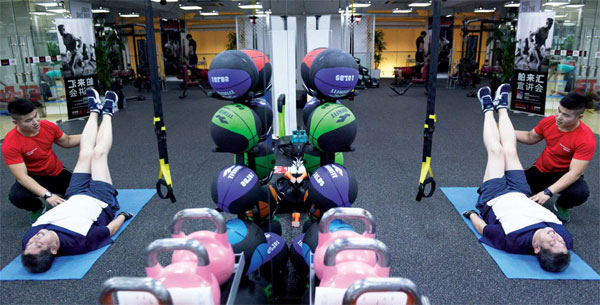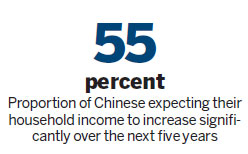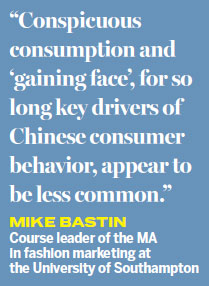Riding on emotions
Updated: 2016-04-08 08:19
By Andrew Moody(China Daily Europe)
|
|||||||||
|
People at a gym in Beijing. More Chinese consumers are focusing on healthy eating and sports as they move toward healthy living. [Photo by Wei Xiaohao / China Daily] |
Many leading automotive manufacturers now launch their new models first in China, the world's largest car market.
Wang Qing, professor of marketing and innovation at Warwick Business School in the UK, says this is because Chinese consumers are always clamoring for something new.
"They are seeking novelty. They get a thrill out of getting the latest product. There is also a conspicuous consumption motive," she says.
"The Chinese are very social people and if you buy the latest thing, it gives you a talking point among their friends and peers. Western consumers are much more rational. They are more likely to analyze the cost and benefit of any new product and are prepared to wait three or six months when it might be cheaper."
Wang says that companies are being forced to respond to this and cannot take the Chinese market for granted like they may have done in the past.
"They now realize it would be a huge mistake to do what they sometimes did in the past and just try and sell some outdated model to China on the assumption consumers were somehow unsophisticated."
The McKinsey report highlighted just how much consumerism has become a fundamental part of the fabric of life. Apart from the well-documented obsession with online shopping, some 64 percent of those asked said going shopping was now one of the best ways to spend time with their families, up from just 43 percent in 2012.
Those selling to China now also have to take into consideration that there is a move toward healthy living. Perhaps reinforced by recent food scandals, some 50 percent of Chinese consumers are now focused on healthy eating.
This could be bad news for international brands such as Coca-Cola and Pepsi with the percentage of those consuming carbonated soft drinks falling from 84 percent in 2012 to 63 percent in 2015. Consumption of Western fast foods is also down from 67 to 51 percent over the same period, and ice cream was down from 65 to 58 percent. The number of urban consumers participating in sporting activities, 73 percent, is now higher than the 70 percent in the US.
"This is one of the big changes that has taken place over the past 12 to 18 months. It is something that has been talked about in our previous surveys going back more than a decade, but now it has actually happened," adds Zipser at McKinsey.
One of the major trends, however, is that Chinese consumers now want to trade up to premium brands over mass market brands. In almost every product category, consumers are wanting the best they can afford.
With cosmetics, 44 percent want to trade up, spirits 36 percent, milk 29 percent, hair care 26 percent and even rice 25 percent.
Zipser says this can be far too easily dismissed as the sort of nouveau riche behavior seen in other fast-developing societies, but he believes it is a far more subtle than that.
"It is essentially about buying a more expensive shampoo or beer and not some crazily expensive one. It is more about consumers saying they want quality brands and anyone doing business in China has to be aware of this."
Where Chinese consumers, particularly younger ones, often differ from Western consumers is being heavily influenced by fashion trends in their Asian neighbor, South Korea.
Although the chart-topping Gangnam Style from the South Korean musician Psy may have permeated Western culture, everything to do with South Korea, from movies and soap operas to lipstick, is seen as cool in China.
"South Korea has very much influenced the millennial generation in China, and it is something that distinguishes the Chinese consumer from their Western counterparts," says Wang at Warwick Business School.
"It is interesting that the deeply philosophical and reflective culture of Japanese society has very little resonance with young Chinese."
Eden Yin, senior lecturer at Judge Business School at the University of Cambridge, says what is seen as erratic behavior among Chinese consumers is often the result of a herd mentality.
"I have lived in both the US and the UK. People in the US often spend their spare time outdoors or doing DIY. Here in the UK, many people spend their time reading. Chinese people spend their time socializing, particularly on social media like WeChat. They are basically bored, and that is why they get excited by these fads and trends that suddenly sees everyone rushing to buy the same product," he says.
Today's Top News
Chinese soccer aims to be among world top teams by 2050
Ministry says e-commerce tax brings no trouble for tourists
China gains stakes in Piraeus Deal
Riding on emotions
When the Bard met his Chinese match
EU to benefit from China's 13th Five-Year Plan
New app lets users text like Shakespeare
Zhubi Reef lighthouse comes to life
Hot Topics
Lunar probe , China growth forecasts, Emission rules get tougher, China seen through 'colored lens', International board,
Editor's Picks
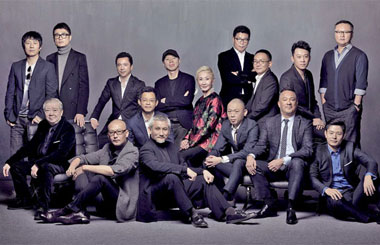
|
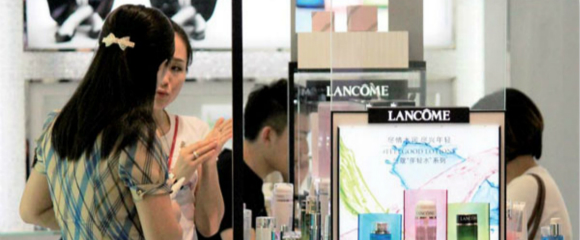
|

|

|

|

|
